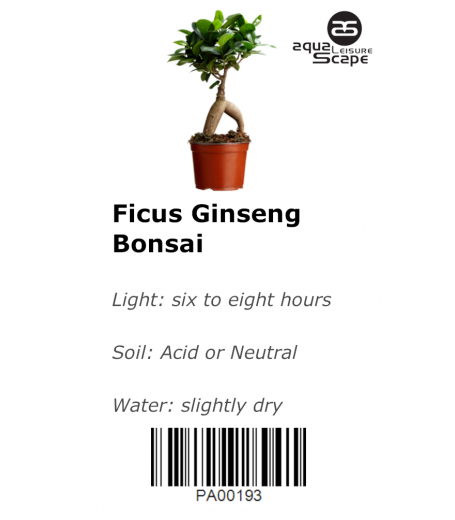BONSAI TREE
- RM35.00
Ginseng ficus is commonly used for bonsai, particularly for its narrow elevated roots that swell into a potbelly trunk and thin at the branches before spreading out to the crown. Ginseng ficus is a tropical plant native to Southeast Asia and is a member of the Moraceae or mulberry family. Ginseng ficus grows best in acidic to neutral soil with higher humidity and full sun from a nearby window.
The sap from this plant is toxic to humans, and touching it can cause skin irritation and allergic reactions; wash hands after touching it.1 Ginseng ficus is toxic to dogs and cats.2
| Common Name | Ginseng ficus |
| Botanical Name | Ficus retusa and Ficus microcarpa |
| Family | Moraceae |
| Plant Type | Tree, evergreen |
| Mature Size | 12-24 inches tall |
| Sun Exposure | Full, partial |
| Soil Type | Well-drained |
| Soil pH | Acid, neutral |
| Hardiness Zones | 9-11 (USDA) |
| Native Area | Asia |
| Toxicity | Toxic to humans, toxic to pets12 |
Light
Your bonsai will need six to eight hours of light. Indoors, placing it on a windowsill is a good idea. If this is not available, grow lights can aid in growing your ginseng ficus. If you take your tree outdoors during the summer, plan to place it in a spot with plenty of sunlight but not too much afternoon sun. The bonsai will not tolerate shade at all.
Soil
Ginseng ficus trees do well in a soil mix of sixty percent aggregate and forty percent organic matter. You can buy a premix or make your own using pine bark, lava rock, and a product called akadama, which holds water and slowly breaks down over time.
Water
Water your ginseng ficus thoroughly whenever the soil gets slightly dry. Misting the plant daily is a good idea, but do not water it to the point where the bonsai is dripping, or fungal issues can occur. More frequent watering will be needed if your plant is in a hot environment.
Take a damp paper towel and carefully wipe the leaves off when they get dusty. You can also use a spray bottle to mist the leaves.
Temperature and Humidity
The ginseng ficus is an indoor bonsai and is not frost-hardy. It can be brought outside once temperatures are consistently above 60 F but must be kept in the sun and not allowed to dry out. Low humidity can be tolerated due to the waxy surface covering the ficus’ leaves, but it will thrive in a humid environment.
Fertilizer
Bonsai draw on very little soil, so it is necessary to replenish their nutrients occasionally. Any multi-purpose liquid fertilizer available at your friendly local nursery or garden center should be adequate. For bonsai, dilute the mixture by 50% with water before applying monthly.
Reviews
There are no reviews for this product.



